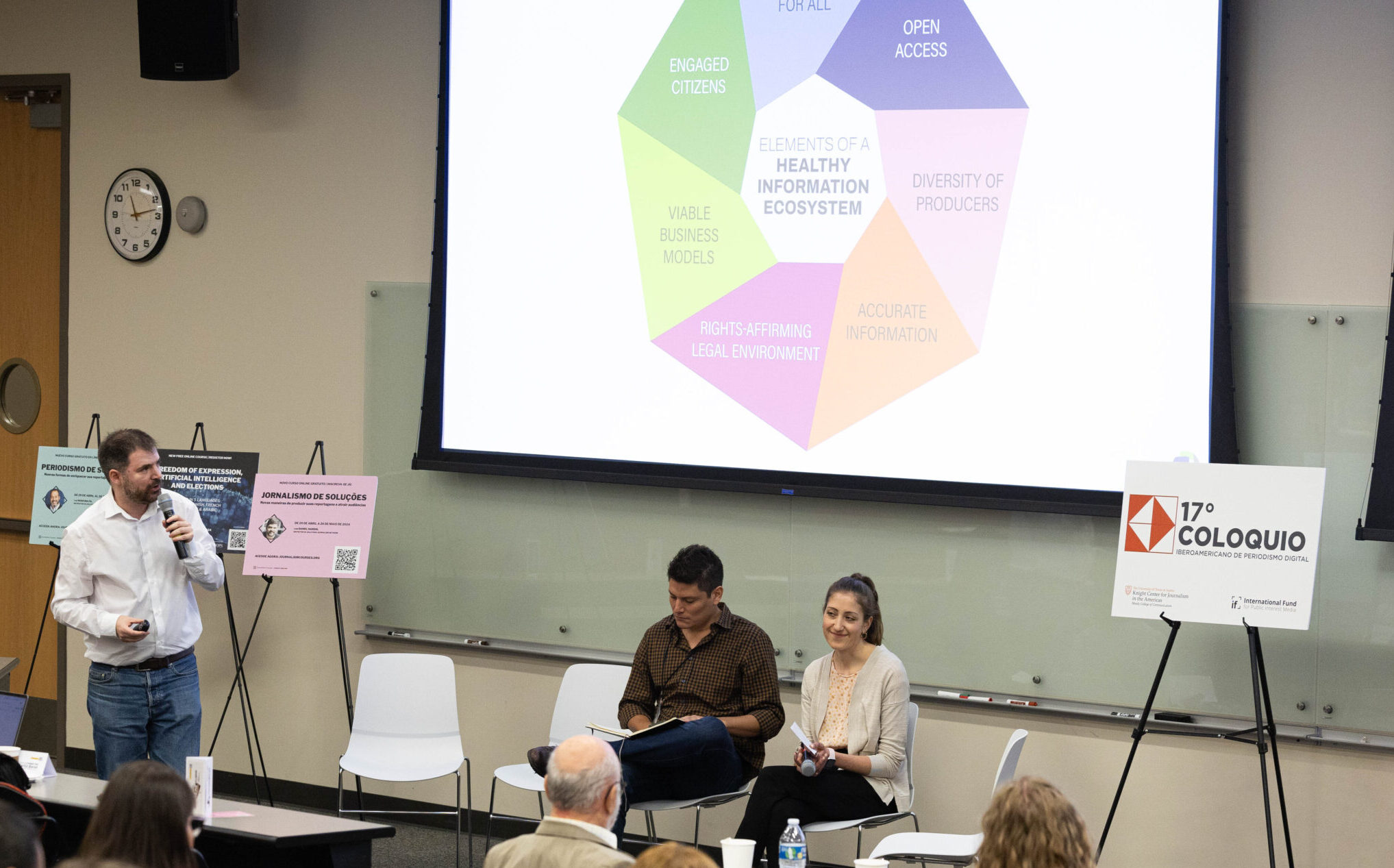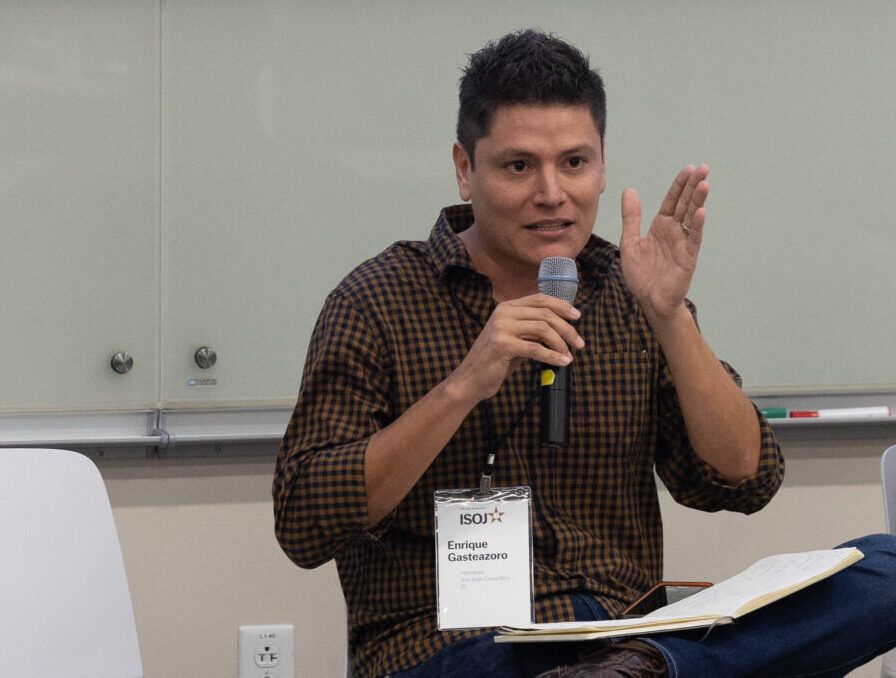Digital media outlet Confidencial, from Nicaragua, is proof that cross-border approaches in journalism can be the lifeline for media under attack, according to Nicaraguan Enrique Gasteazoro.
In December 2018, amid a series of measures by President Daniel Ortega's regime in response to social protests, Confidencial suffered a raid on its newsroom in Managua, the seizure of equipment, and harassment of several of its workers, including its founder Carlos Fernando Chamorro.
The Confidencial editorial office was occupied for two years, until it was converted into a maternal care home of the Nicaraguan Ministry of Health in 2021. However, the media outlet continued to function, with part of its team in exile.

The Internews team in the Americas explained how the organization works to improve information ecosystems in the region. (Patricia Lim/Knight Center)
“I am absolutely convinced that cross-border approaches are fundamental for the resilience of the media,” Gasteazoro said during his presentation on cross-border approaches to empower local journalism and mitigate disinformation at the 17th Ibero-American Colloquium on Digital Journalism.
“For Confidencial, this really was a key to how the media outlet has survived and even evolved.”
Gasteazoro, who was general manager of Confidencial between 2017 and 2022, said that the 2018 crisis in Nicaragua found the media outlet in a stage of breaking established borders, such as the border between business and journalism that existed in previous decades. The media outlet had begun to apply a product approach and design thinking principles to the way it did journalism and to its relationship with its audience and advertisers.
“What the crisis did was nothing more than accelerate the media's commitment to all of that,” said Gasteazoro, who today is project director in the Americas for Internews, a nonprofit organization that supports independent media in more than 100 countries in their fight for sustainability against disinformation.
Gasteazoro participated in the panel along with colleagues Julia Knoerr and Pablo Arcuri, senior program associate and regional director in the Americas at Internews, respectively.
His job at Internews, Gasteazoro said, is to help other media outlets in the region cross borders beyond geography, as Confidencial did. For example, borders between journalism and business, technology or innovative formats.
He presented the Regional Project for Central American Media, which aims to promote collaborative and cross-border approaches in independent media and journalists in the subregion. This is done in order to strengthen the management and development of audiences, as well as the construction of institutional and collaborative relationships. This is key, according to him, for resilience and security.
According to Gasteazoro, for Confidencial it was essential to learn skills from media outlets in other countries in similar situations, such as managing networks of clandestine reporters or preparing for laws that restrict freedom of expression. He also highlighted the importance that the Salvadoran media outlet El Faro played for the survival of Confidencial. Likewise, he said that the Nicaraguan media outlet has been of great support so that El Faro can continue reporting on El Salvador, now from Costa Rica.
“This particular project has enormous potential to strengthen the resilience and impact of the Central American media ecosystem,” he said.
Arcuri said that Internews works to improve information ecosystems that are composed not only of media, but also of other elements, such as involved citizens, open access to news, diversity of information producers, a pro-rights legal environment, viable business models, accurate information and security for all those components.
“This democratization of media is important. We obviously greatly recognize the exercise of journalism, but we also believe that everyone has the right to consume and produce information,” Arcuri said. “The perspective we are looking for is precisely to improve the creation of content so that there is content that is of quality, that is true and that is also relevant for consumers.”
Arcuri said that today in Latin America there is a model of cross-border journalism that emerged almost by accident, which is journalism from exile. In addition to Confidencial and El Faro, there are currently media outlets from at least five countries working from exile, he said.
“[Journalism from exile] is posing new challenges regarding how we establish ourselves, how we communicate, how we continue reporting from exile,” he said. “We're also seeing a lot about how there are new ways to innovate.”

Nicaraguan Enrique Gasteazoro said he is convinced that cross-border approaches are key to media resilience. (Patricia Lim/Knight Center)
In the area of the role of citizens in information ecosystems, Arcuri said that Internews perceives a crisis of credibility in the media of almost all Latin American countries. The organization registers low credibility rates of up to 15 percent, which represents a factor that promotes disinformation.
“Right now there is a very, very strong divorce between the media and its audiences,” he said. “Only 15 percent of people really believe in what they are consuming. And those who do, sometimes do not trust the media outlet, but instead trust specific journalists from that media outlet.”
Arcuri said that Internews' work in the region also includes promoting strategies to regain the trust of audiences.
Added to the above is the security crisis facing journalism in the region. The cross-border approach that Internews promotes, Arcuri said, includes addressing the safety of journalists, not only physical and digital safety, but also psycho-emotional safety.
Disinformation is a phenomenon that crosses geographic, thematic and disciplinary boundaries, so cross-border approaches in journalism also place emphasis on combating the impact of false news and misleading information, Knoerr said during the panel.
The senior program associate at Internews said that, at a hyperlocal level, disinformation operates differently in each community, which is why a collaborative strategy at the regional level is necessary to combat it.
Knoerr said that Internews is implementing the project Mitigating Disinformation in Latin America and the Caribbean, which consists of investigating the information ecosystems of three populations with high levels of disinformation in Bolivia, El Salvador and Brazil.
“We are doing research into the information ecosystems that serve as the foundation of our approach to working at the regional level,” Knoerr said. “We are doing all of this work in conjunction with local organizations that already have the trust of the community and are very close to what is happening.”
Some of the trends that have been discovered so far in the project are that levels of disinformation in these populations increase during times of sociopolitical crisis, environmental crises and electoral times, Knoerr said. They have also found that the main actors who generate disinformation are political figures.
The research, she added, will serve as a basis for designing strategies and actions to mitigate disinformation. In collaboration with local organizations and a regional organization, they will seek to develop media literacy campaigns and training for members of affected communities on how disinformation operates and how to identify specific sources of false or misleading information.
“We want to empower community members, journalists, human rights defenders and community leaders to more critically consume information and to mitigate disinformation,” Knoerr said.
Arcuri announced that another Internews project that is on the horizon is a training program for journalists on environmental reporting in the Amazon, which they will carry out in alliance with CONNECTAS.
The Ibero-American Colloquium on Digital Journalism is an annual meeting of journalists from the region that is organized by the Knight Center for Journalism in the Americas. It is traditionally held the Sunday following the close of the International Symposium on Online Journalism (ISOJ) and this year was held on April 14. A recording of the Colloquium can be found here.